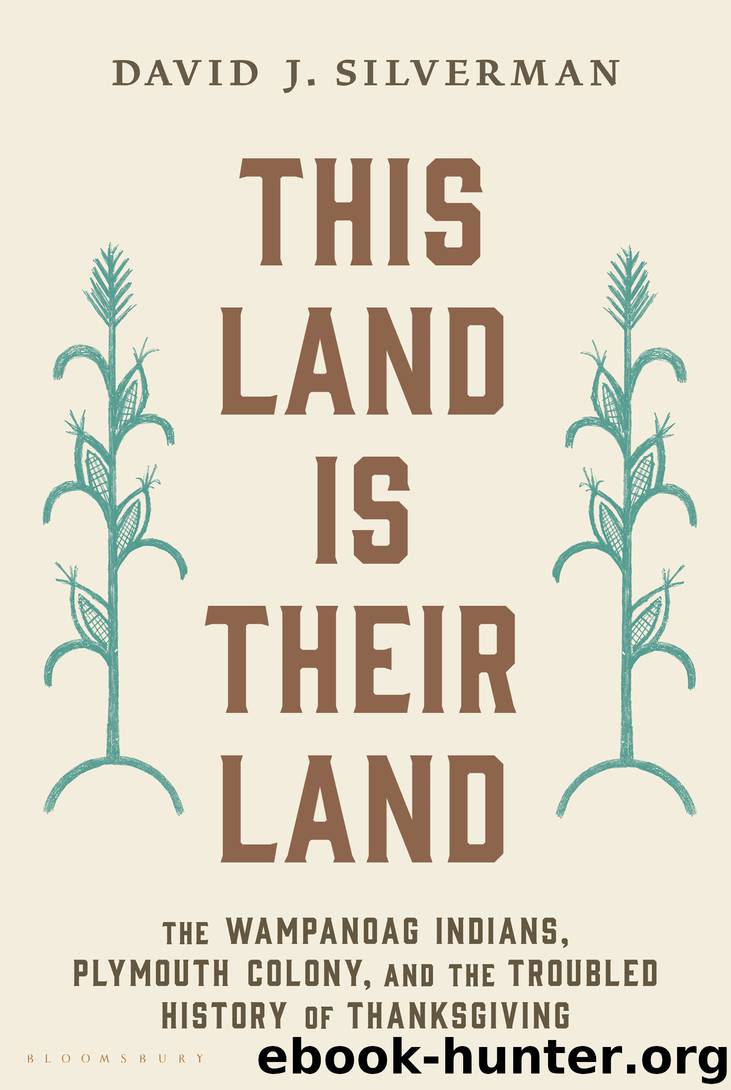This Land Is Their Land by David J. Silverman

Author:David J. Silverman
Language: eng
Format: epub
Publisher: Bloomsbury Publishing
Josiah Winslow, 1651. Pilgrim Hall Museum, Plymouth, Massachusetts.
Josiah Winslow (1628–1680) served as Plymouth’s major-commander of military forces in 1656, commissioner to the United Colonies of New England from 1658 to 1672, and governor from 1673 until 1680. With the English population and power growing, he turned away from his father, Edward’s, approach of sensitive Indian diplomacy in favor of strong-arm and underhanded tactics to engross Wampanoag land and subject the Wampanoags to English authority. His aggression contributed mightily to the outbreak of King Philip’s War.
SHIFTING LOYALTIES
The war scares not only inflamed relations between the mainland Wampanoags and the English but widened already deep fault lines between Christian Wampanoags of the Cape and islands and the Taunton River sachemships under Pumetacom. During the mid-1660s, Christian Wampanoags used the occasion of Ousamequin’s death and his sons’ supposed plotting to lobby their English missionaries for help in establishing a Christian magistracy. Their intention, it would appear, was to distance themselves from the impending conflagration on the mainland. The process began in 1665 when the Mashpee Wampanoags appointed six men—Papmunnuck, Keencomsett, Watanamatucke, Nanquidnumacke, Kanoonus, and Mocrust—to serve alongside Richard Bourne as justices and constables. Plymouth approved but was at pains to emphasize “that what homage accustomed legally due to any superior sachem be not hereby infringed.” Time would prove these words to be hollow. A similar reform took place on the Vineyard six years later, in 1671, amid the most serious war scare to date. The Christian Wampanoags and Thomas Mayhew Sr. arranged to have each Native community elect three Christian magistrates to hold formal courts presided over by the local sachem, who would exercise a veto over all decisions. Wampanoags would run the system, but for the meantime they agreed to consult with Mayhew on their choice of officers. Nantucket Wampanoags would adopt parallel measures over the next couple of years. It was precisely as Ousamequin had once feared.47
These steps took the Christian Wampanoags out of Pokanoket’s orbit and halfway into the English fold. On the Vineyard and Nantucket, Wampanoags who appealed the decisions of their own courts had their cases heard by English magistrates, who could rule according to their own definitions of justice. The greater concern for Pumetacom was that if the Christian Indians appealed their disagreements to English courts, they would no longer need him to arbitrate stubborn local cases, thus reducing his authority and tribute. Pumetacom was still fulfilling this role as late as 1665. That year, English authorities charged a group of Nantucket Wampanoags with murdering the passengers of a shipwreck, the victims of which included the Vineyard Wampanoag Joel Hiacommes, who had been on his way back home to pay a visit before his graduation ceremony from Harvard. Faced with the impossible question of whether to turn over the accused to colonial justice, the Nantucket sachem, Nickanoose, headed for the mainland to seek the advice of his “head sachem,” Pumetacom. Afterward, Pumetacom himself appeared on Nantucket, probably to lend his assent to the hanging of the killers while ensuring that the judicial executions stopped there.
Download
This site does not store any files on its server. We only index and link to content provided by other sites. Please contact the content providers to delete copyright contents if any and email us, we'll remove relevant links or contents immediately.
| African-American Studies | Asian American Studies |
| Disabled | Ethnic Studies |
| Hispanic American Studies | LGBT |
| Minority Studies | Native American Studies |
Cecilia; Or, Memoirs of an Heiress — Volume 1 by Fanny Burney(31333)
Cecilia; Or, Memoirs of an Heiress — Volume 3 by Fanny Burney(30934)
Cecilia; Or, Memoirs of an Heiress — Volume 2 by Fanny Burney(30889)
The Great Music City by Andrea Baker(21313)
We're Going to Need More Wine by Gabrielle Union(18074)
Bombshells: Glamour Girls of a Lifetime by Sullivan Steve(13109)
Pimp by Iceberg Slim(12931)
All the Missing Girls by Megan Miranda(12749)
Fifty Shades Freed by E L James(12451)
Norse Mythology by Gaiman Neil(11883)
Talking to Strangers by Malcolm Gladwell(11879)
Crazy Rich Asians by Kevin Kwan(8349)
Mindhunter: Inside the FBI's Elite Serial Crime Unit by John E. Douglas & Mark Olshaker(7834)
The Lost Art of Listening by Michael P. Nichols(6474)
Enlightenment Now: The Case for Reason, Science, Humanism, and Progress by Steven Pinker(6406)
Bad Blood by John Carreyrou(5769)
The Four Agreements by Don Miguel Ruiz(5511)
Weapons of Math Destruction by Cathy O'Neil(5037)
We Need to Talk by Celeste Headlee(4870)
